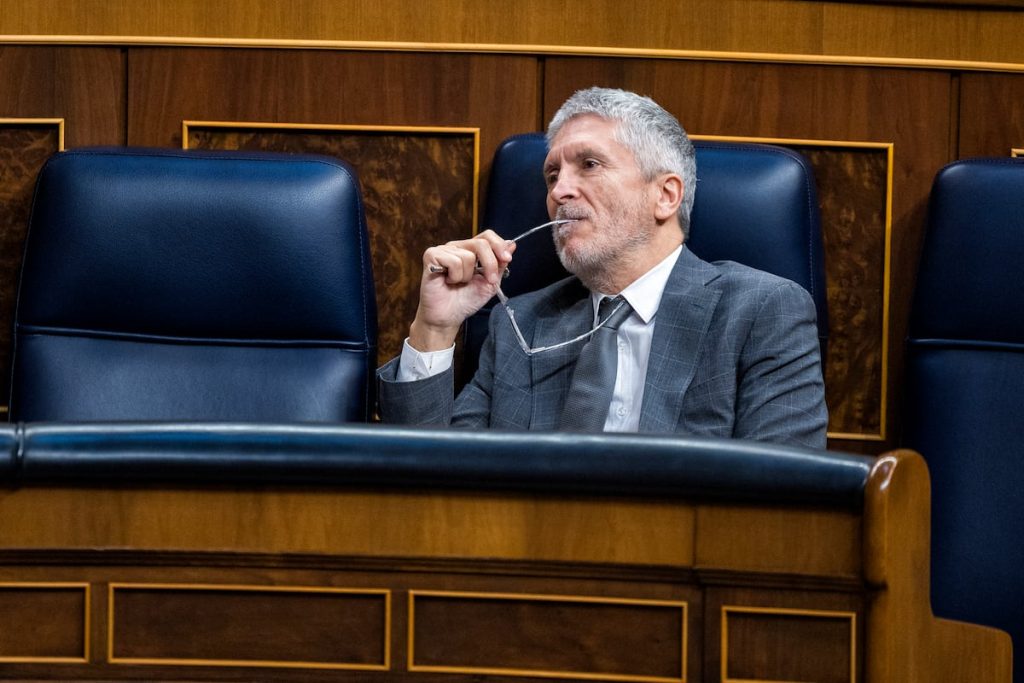The Interior Minister, Fernando Grande-Marlaska, has suffered another setback in court. The National Court has nullified 56 decorations that the Directorate General of Police awarded to agents in September 2022. These include seven silver medals for high-ranking officers who were retiring, and 49 red crosses for active-duty agents, all with a lifetime financial reward ranging from 15% of the base salary and triennials for the former to 10% for the latter. These are known as “valor medals”. Each year, the National Police spends over 11 million euros on paying the lifelong pensions generated by these decorations. This ruling comes a year after the National Court overturned another decision by the Interior Minister regarding decorations, though that time it was in the opposite direction. Grande-Marlaska had awarded a lower-ranking white cross to Colonel Manuel Sánchez Corbí of the Guardia Civil, whom he had removed as head of the Central Operative Unit (UCO) in the summer of 2018. The court ordered that the officer be given the Silver Cross, one of the highest honors.
The new ruling, issued by the Central Administrative Court 1 judge Lourdes Pérez Padilla, came after four police unions – Justicia Policial, the Unified Police Union, the Federal Police Union, and the Spanish Police Confederation – filed lawsuits seeking the nullification of part of the general order that granted over 2,800 medals, in various categories, in September 2022 to celebrate the institution’s patron saint. The vast majority of those awards were white crosses, which are purely honorary recognitions with no monetary reward. The unions challenged the 10 silver medals awarded to retiring police commissioners and the 49 red crosses given to other officers in different ranks, arguing that there were “formal defects” in the award process and that the individual files justifying the awards did not meet legal requirements. The ministry defended that all required procedures were followed, including consulting the police unions and allowing them to submit objections if they did not believe the awards were legal.
The judge sided with the unions, concluding that the Ministry of Interior had neglected the “necessary” involvement of the unions in the award process by only providing verbal, incomplete information during a short meeting. Additionally, the judge found that the individual medal files lacked the necessary evaluations and reasons for the awards, essential for judicial review. As a result, the judge annulled the 56 medal awards and rejected the State Attorney’s request to rewind and restart the process. This decision comes amid similar legal challenges for the awarding of silver medals to high-ranking police officials, a year after the recently annulled awards. The awarding of medals in the National Police, especially those with financial rewards, has long been controversial due to concerns of favoritism and discretion in the selection process.
The awarding of medals in the National Police is governed by a 1964 law that reserves valor decorations for agents who have been “injured in the line of duty”, participated in “three or more services” involving the risk of armed aggression, or displayed bravery in dangerous circumstances. Critics argue that this vague criterion has allowed ministers of Interior to potentially reward politically-aligned agents at their discretion. Indeed, this was the rationale used to award pensioned medals to alleged members of the “patriotic brigade”, some of whom face charges for spying on former PP treasurer Luis Bárcenas. The ongoing controversy surrounding police decorations highlights the need for transparency and impartiality in the awarding process to ensure fairness and integrity within the law enforcement institution.


